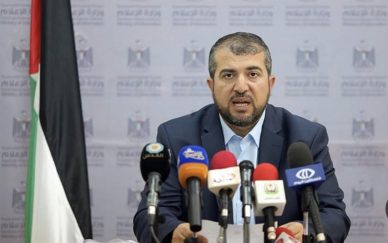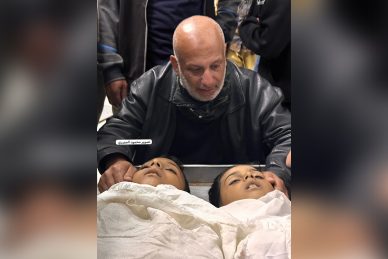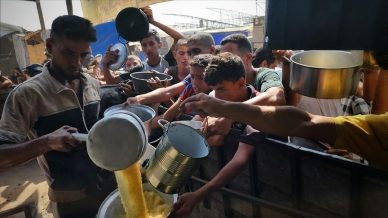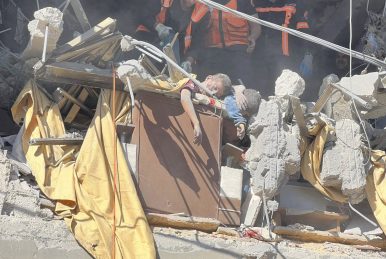GAZA, (PIC)
Adham Dawoud’s life was turned upside down, and his dreams of enrolling in the engineering college this year were shattered due to the loss of the academic year in the Gaza Strip.
Dawoud, a general secondary school student from Haroun Al-Rashid School in Khan Yunis, did not sit for the general secondary school exams, like thousands of students whose educational future was destroyed by the Israeli extermination war, due to the destruction of the infrastructure of schools and universities in Gaza.
In a testimony documented by the Al-Mizan Center for Human Rights, Dawoud says he is working to provide the necessary supplies for his family, and feels like a marginalized person without a future. “I aspired to register in an interior design engineering specialization at the university, but now my dream is for the war to end, so that I can return to my school and complete my studies.”
Since the first day of the aggression, the educational process at all levels, in universities, schools, and educational and training centers, has stopped. Schools have turned from educational institutions into shelters used by the displaced residents who were forcibly evicted from their homes. Nevertheless, the Israeli occupation forces did not hesitate to target the schools and facilities even as they were overcrowded with the displaced.
“My life was destroyed”
In a detailed report published by the Center under the title: “Genocide of Education in the Gaza Strip in the Context of Genocide”, the girl Lian Ali Abu Al-Ata narrates how she lost her right leg after the minaret of a mosque was bombed while she was staying at a nearby school in Deir Al-Balah in the Gaza Strip. She had fled there with her family from the Shujaiya neighborhood.
Lian (13 years old) said that her fractures and wounds turned into gangrene, which prompted the doctors to transfer her to Egypt in an attempt to save her leg, but the seriousness of the situation led the doctors to the decision to amputate it above the knee.
Lian suffers from paralysis in the lower half of her body. “I don’t know how I will later be able to attend my school after the end of the war, as I cannot move. My life has been destroyed.”
The Center’s report confirms that the occupying forces did not give the students any opportunity to complete their educational path, due to the inhumane and disastrous conditions they created through their direct targeting of schools and universities, and the destruction of their archives and records, in addition to cutting off electricity and Internet services.
Systematic destruction
The report emphasizes that the systematic destruction of the educational infrastructure, along with the killing of teachers and lecturers, the injury of other skilled personnel, and the departure of some of them and their presence outside the Gaza Strip, “will pose a challenge to attempts to restore the education sector to operation.”
It indicates that educational facilities, whether belonging to the Ministry of Education, the United Nations Relief and Works Agency for Palestine Refugees (UNRWA), or even private and civil society organizations, have not been spared.
Farid Abu Azerah, the Director-General of Education at UNRWA, says that two-thirds of UNRWA schools were bombed by the occupation, and 197 of the UN organization’s employees were martyred.
Abu Azerah, in his testimony to the Al-Mizan Center, confirms that the ongoing genocide war on Gaza for the tenth consecutive month has caused the complete destruction of the educational system, and has placed hundreds of thousands of students at all educational levels, in the face of an unknown future.
He explains that the matter is not limited to the current academic year, as the systematic destruction of educational facilities, infrastructure, and homes has made it difficult to plan and enroll students in their academic seats after the aggression.
Abu Azerah points out that converting UNRWA schools into shelters will delay the resumption of studies after the end of the aggression, and will increase the pressure on the already damaged educational infrastructure. It will also require significant efforts to rehabilitate the buildings and prepare them to receive students again.
He adds that “what the students have lost cannot be compensated, and it will greatly affect their academic achievement and personal development, the possibility of increasing the dropout rate from schools, the delay in academic progress, the risk of child labor, early marriage, the deterioration of the child’s concepts of human rights, and the shaking of their sense of belonging to their identity.”
According to the data mentioned in the Mizan report, the government schools include 360,000 students distributed across 442 schools. The occupation forces completely destroyed 285 of these schools, killed 9,000 students from the school and university levels, and injured 14,000, including about 3,000 who became disabled. They also killed 400 teachers in the schools and 100 from the university staff, and destroyed more than 80% of the university buildings.
Indirect effects
The report also addressed the indirect impact of the genocide on the education sector in Gaza, emphasizing that the continued imposition of a complete siege on Gaza has had disastrous psychological and physical effects on children, weakening their academic performance, especially those who have lost one or both parents, or have lost a limb or more, or have sustained permanent disabilities as a result of their injuries.
The deep psychological effects suffered by students and teachers due to the tragic events they witness include the impact of negative emotions such as fear, anxiety and depression, and psychological trauma due to constant psychological stress and material and human losses, such as the loss of relatives or homes, according to data released by the Palestinian Central Bureau of Statistics.
The Bureau’s report published last April on the situation of Palestinian children shows how the war of genocide can affect children’s behavior and daily life, such as changes in sleep patterns, nutrition and social relationships.
The report adds that children’s exposure to painful physical injuries or the loss of loved ones increases their need for psychological and emotional support to recover from these painful experiences, noting that more than 816,000 children in the enclave need psychological assistance due to the ongoing effects of the war on Gaza.
Estimates by the United Nations Children’s Fund (UNICEF) indicate that more than one million children in the Gaza Strip are showing symptoms such as extremely high levels of persistent anxiety, loss of appetite, inability to sleep, emotional outbursts or panic every time they hear explosions, and they all need mental health services and psychosocial support.














